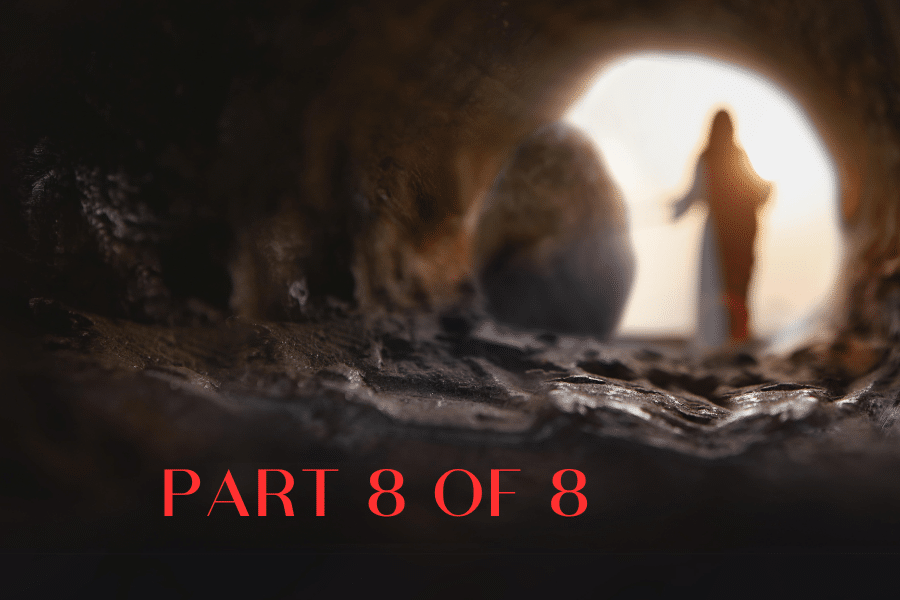Part 8 of 8 in a series of articles by Derek Caldwell on the resurrection. Published April 3, 2024
I have heard it said before: so what if Jesus was raised from the dead? Why does that mean I have to worship Him? This is such a sad statement, for it speaks of the cultural saturation of the resurrection in the West—the type of saturation that can breed familiarity and, later, apathy and indifference. Tom Holland passionately explains,
Familiarity with the Easter story has desensitized us to what both Paul and Nietzsche, in their very different ways, instinctively recognized in it: a scandal. The cross, that ancient tool of imperial power, remains what it has always been: the fitting symbol of a transfiguration in the affairs of humanity as profound and far-reaching as any in history. ‘God chose the weak things of the world to shame the strong.’ It is the audacity of it — the audacity of finding in a twisted and defeated corpse the glory of the creator of the universe — that serves to explain, more surely than anything else, the sheer strangeness of Christianity, and of the civilization to which it gave birth.1
To return to the original point, you do not have to worship Christ—God allows us the dignity of choosing life with or apart from Him—but perhaps we should want to. Here’s why I think so.
The resurrection served as a vindication of what Jesus had been saying about Himself all along, if we understand why and how He said certain things about Himself. It vindicated the notion that Jesus was more than just a man: He was the Good Shepherd and King prophesied in Ezekiel who is somehow both King David (or rather a descendant of King David) and Yahweh (see Ezekiel 34); He is the disease-and-disability-defeating rescuer known in the Old Testament as Yahweh (compare Matthew 11:4 and Luke 7:22 with Isaiah 35:4-6 and 61:1-3)2; He is the great “I AM” through whom all things were made, visible and invisible (compare Genesis 1:1, Exodus 3:14 with John 1:1-3 and 8:58). In other words, Jesus is God (along with the Father and the Holy Spirit). The resurrection thus points to the greatest miracle of them all: the incarnation, the Son of God becoming a human being so that human beings might become sons and daughters of God.
Jesus became man because we couldn’t reach Him, but He desired to reach us and to lift us out of death and into abundant eternal life. He came to rescue us from ourselves, from our sins, from our sufferings, from the hurt we have caused and the hurt we have endured, from the pain that shaped us, that hardened us, that broke us. And He invites us to become like Him, who took the pain given to Him and turned it into healing for the world. He invites us now to participate in His life and become fellow “wounded healers.”3
The resurrection also did things, cosmic things. It turned the crucifixion, which might have been just another Roman execution, into the defeat of sin, death, and the devil. It made real, eternal life possible and desirable. It gave a pathway to eternal bliss and eternal peace with God, man, and creation (all of which will still exist when it’s all said and done). It turned defeat into victory, death into life, justice into mercy, hatred into love.
The overall point, the good news of it all, is this: God is for us. God’s love is true, it is real. It is not just words on a page that must somehow be swallowed, but a miraculous and seismic event that confirms the great declaration that “God is love” (1 John 4:8, 16). The nightmare of life is defeated, and the dream is real, the hope is real. God wants relationship with us still, even if we feel unworthy of it (Romans 5:8). For what are the analogies Scripture uses of God in the New Testament? God is king to protect us, priest to forgive us, friend to comfort us, counselor to guide us, physician to mend us, savior to pull us out of the depths, redeemer to snatch us from predators, husband to love us unconditionally, father and mother to provide for us and nurture us. And for all of our rejection of Him, He comes to us to offer us Himself again and again, His eternal life for our eternal death.
What is easier? For Jesus to say that He is God, or to prove it by destroying the temple, meaning His body where the fullness of deity dwells, and building it up again in three days? He does both, and the latter confirms the former. And so now, we have the chance to say, in a variation from the words quoted earlier: He’s alive! Alive! Oh, by the grace of God, now I know what it is to be loved by God!

Derek Caldwell
Derek Caldwell is researcher and content creator for Embrace the Truth.
References
1 Tom Holland, “The way of the cross,” The Spectator, April 20, 2019, Accessed August 14, 2020, https://www.spectator.co.uk/article/the-way-of-the-cross.
2 This allusion first came to my attention through Robert M. Bowman, Jr. & J. Ed Komoszewski, Putting Jesus in His Place (Grand Rapids, MI: Kregel, 2007), 203.
3 This term was coined by the psychologist Carl Jung (some have located the notion in ancient thought as well), though I use it more in the Christological way popularized by Henri Nouwen.

